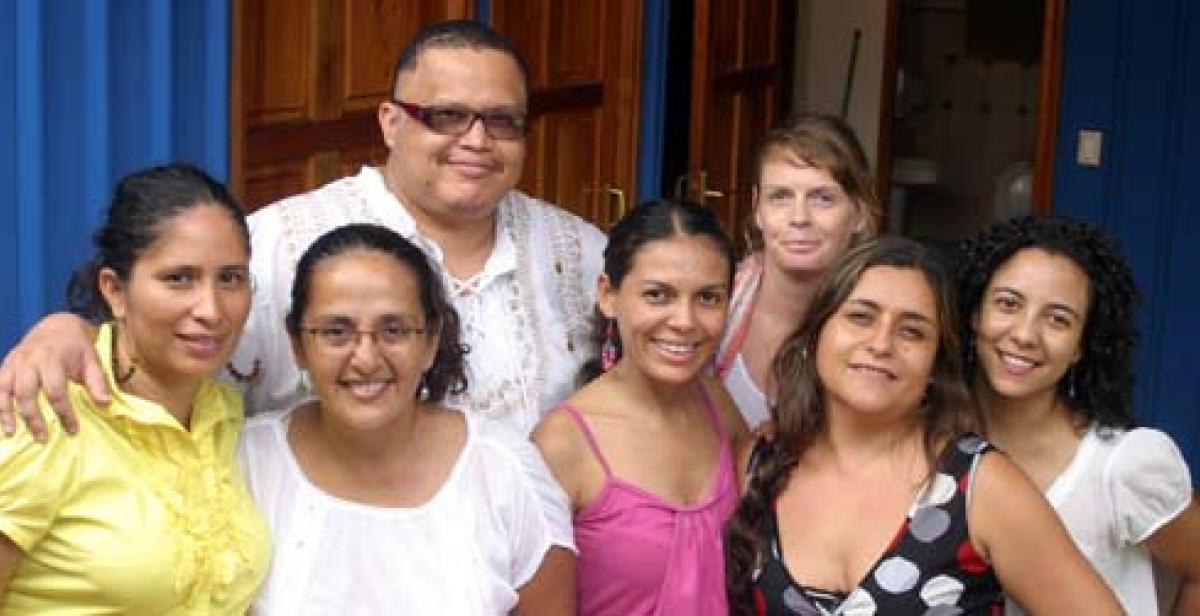Yerina Rock, from Sweden, was a Development Worker with Progressio in Nicaragua from August 2008 to July 2010.
What are you doing at the moment?
I am a preschool, primary and secondary school teacher.
Please describe your role as a Development Worker and the organisation where you worked
I was part of a team that was developing and producing a feminist soap opera for the Central American region. We addressed a series of taboo issues, such as the sexual exploitation of young people, sexual diversity and gender identity, and the control and management of money between couples in the household, among others.
My role was to research the different themes, and speak with partner organisations working in those areas, in order to develop storylines and attractive characters with a team of scriptwriters.
Puntos de Encuentro is a Nicaraguan feminist organisation, which works so that young and adult women can exercise their rights and autonomy in everyday life. They use the media, together with training processes and networking, in order to promote and uphold gender and cross-generational equality.
What inspired you to apply to be a Development Worker for Progressio?
I came across the first soap opera by Puntos de Encuentro, Sexto Sentido, and was fascinated not only with the concept of using popular culture as a way of questioning chauvinistic norms and practices and of promoting gender equality, but also with the fantastic reputation it had among young people in the region.
What struck you most about the Development Worker model used by Progressio?
I think it is excellent that the Development Worker integrates her/himself into a local organisation, since they often better understand the problems in the context of the country where the Development Worker is carrying out their work. Although it is great to have wider perspectives or perspectives from other contexts, it is vital to connect them with local knowledge.
What did you enjoy most about your experience as a Development Worker?
I loved creating fictional worlds for the characters which, at the same time, reflected real life situations.
What were some of your greatest achievements during your time as a Development Worker?
I worked intensively with a team on the development of a storyline for the series about the commercial sexual exploitation of adolescents. I spoke to young women who had been in this situation, I explored cities where these dynamics were visible, I spoke to experts on the subject, and I read a lot. I ended up very satisfied with the result as it contained the two key elements that we set out to achieve: a storyline with a lot of tension and drama, as well as an accurate reflection of reality.
What were some of the main challenges and lessons learnt?
Creating a television series is very expensive and in many cases, as was the case with our series, financing can be more complicated and prolonged than one would imagine. Also, the lack of infrastructure and knowledge on creating a high quality TV series in Nicaragua meant there was a great deal of trial and error. These two challenges delayed the progression of the project.
Did this experience change you as a person in any way?
I came back from Nicaragua a more committed feminist and with a greater clarity on the importance of solidarity and our responsibility for the well-being of people in every corner of the world.
In what way do you think this experience helps you or will help you with what you want to do now or in the future?
Through my work, I discovered the power of TV in breaking silences and questioning norms. This fascinates me and is motivating me to continue exploring the use of the media to promote progressive social change.
What advice would you give to someone who is thinking of applying to be a Development Worker?
If you want to challenge yourself in every way, and also learn and better understand the limits and possibilities of international development on the ground, this is an excellent opportunity.



